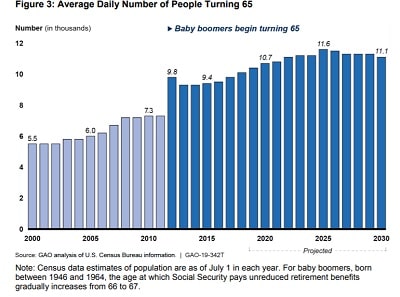by: Mattis W.
When more people from all walks of life are hitting their retirement age, it implies the need for a change in an area which society often neglects but should pay close attention to – senior housing.
Let’s take a closer look at the underlying trends to understand what is happening in senior living.
The Cresting Silver Tsunami
According to population and retirement research conducted in 2019 by the U.S. Government Accountability Office, the Baby Boomer Generation (people born between 1946 and 1964) is reaching retirement age in record numbers.
As stated in the full research report, the first boomers began receiving Social Security retirement benefits in 2008, and growing numbers will become eligible for Social Security benefits in the coming years. The analysis indicates that the number of baby boomers turning 65 is projected to increase from an average of about 10,200 per day in 2018 to more than 11,000 per day in 2029.
Although the mass wave of retirements was initially projected to hit government in 2011, the recession put many of these retirement plans on hold. This gave government agencies a short while to breathe, but now it appears that the long-awaited silver tsunami has finally arrived, along with the increased demand for senior living options.

Different Generation, different needs?
According to Andrew Carle, a founding director to senior housing program at GMU in Virginia, the Baby Boomer generation is ‘different’. Unlike older generations, the retired Baby Boomers are not keen on the idea of the ‘traditional’ or ‘old’ senior housing options but want to explore their hobbies and interests.
What does this imply in a society which was used to the idea of putting retirees in a place that has become less interesting to retiring Baby Boomers?
For one, the demand for housing for the aging population has increased and appears to remain high as more and more Boomers are leaving the workforce and looking for senior living communities.
At the same time, the expectations for senior living communities have also risen, enabling seniors to spend their golden years in an exciting way.
Same Retirement Communities, But a Little Different
According to Carle, when interviewed by the Chicago Tribune, a typical retiree starts at the age of 65, putters around the house, travels around and enjoys gardening. However, 10 years down the line, boredom sets in and Boomers seek more company and assistance.
It is at this crossroad where demand for niche senior communities is most likely. It is also reflective of the attitude change between generations. Baby Boomers, more so than the previous generation, seeks peers and amusement.
Introducing the “niche senior community’
Unless you know someone who is planning his retirement in a senior living community, the concept of niche senior communities may be new to you.
Given the age-old adage which suggests that °birds of the same feather, flock together; the niche senior community is a trend among retirees who are seeking companion amongst their fellow retirees, thus building a community of older adults who share similar interests or passions.
Examples of niche retirement communities
Art Communities 
The niche retirement communities are already here. An example of this is the Senior Arts Colony at Long Beach, which was launched in 2013. It offers art classes, galleries of course art equipment for it’s seniors. There are also communities that offer dance and art studios, theater-esque clubhouses, and performance art classes aimed at fostering the artistic talent of their senior students.
Country Communities
 But there are also other areas of interest that a senior niche community would cater to for the retirees, said Andrew Carle. For instance, in Nashville, Tennessee, there’s a community of elders who are exposed to the country music which appeals mainly to seniors who are either country enthusiasts or were former musicians themselves.
But there are also other areas of interest that a senior niche community would cater to for the retirees, said Andrew Carle. For instance, in Nashville, Tennessee, there’s a community of elders who are exposed to the country music which appeals mainly to seniors who are either country enthusiasts or were former musicians themselves.
It also is equipped with the right platform for making live performances as well as rooms to make recordings as needed.
Golf Communities
Communities such as the River Landing Community in North Carolina are specifically designed for senior golf enthusiasts. Some even offer shops to find the best golf clubs, along with Shuttles to various golf courses in the area or even a dedicated course on site.
As golf is one of the healthiest sports for senior women and men, it easy to see why retirees want to invest more time into it.
Other Niche Communities
For well-off retirees who are capable of financing a retirement setting fueling their passion, niche communities exist to cover topics such as:
- Recreational vehicles
- Motorcycles
- Cars
- Fitness
- Equestrians
- Astronomy
- Academia and lifetime learning
- Military Veterans
Is Housing Based on Particular Niches the Future for Seniors?
While it’s difficult to pinpoint precisely when the first few niche communities were established, there were already 100 of them in place since 2011. This number was also set to rise in the subsequent years which puts the demand for the niche retirement communities in an upward trajectory since.
In California alone where three established artist colonies are in place, developer Meta Housing in partnership with the non-profit organization EngAGE claim that their occupancy level seldom drops below 95%, according to Senior Housing News. So if consistent demand allows, more development is likely.
Is living in a niche senior living community right for me (or close family members?)
To decide whether or not a niche living community could be the right choice for you or close family members, you have to consider multiple factors:
- What are you/they interested in? Unsure? See our latest list of activities for seniors and see if you find a match?
- Is this interest determining your/their lifestyle to a large extent? Being interested is not enough to warrant a move to a niche living community, passion and desire to expand on that passion is required
- Where do you/they want to live? While niche communities are growing in number, they are still few compared to the market of senior living options, so location choice matters.
- Do you/they have the means to pay for it? As advertisers know, passionate people pay a premium. It is for this reason, that most niche living communities are upscale and more expensive than alternative options.
- Is space available? Refer to New LifeStyles’ retirement community page to find availability.
This article was contributed by Mattis Weiler. He’s the General Editor of Fast Learners, a website helping senior golf enthusiasts and others to become better at golf.